
In order to improve the workability of concrete, a certain amount of water reducing agent is added during construction. In actual production, water reducing agents are not only used in the construction industry, but are also widely used in high-speed railways.
In recent years, China has entered an era of large-scale construction of passenger dedicated lines and intercity railways. As people's awareness of protecting the ecological environment, saving land, and project durability increases, compared with my country's past railway construction, today's railway construction is mostly bridges and tunnels, which not only requires a huge amount of concrete work, but also puts forward higher requirements for concrete projects. Since the 20th century, concrete technology has developed rapidly. Concrete admixtures and mineral admixtures have become indispensable components of concrete. Only by actively updating concepts and fully understanding and mastering new concrete technologies can concrete project construction be completed successfully with quality and quantity.
High-performance concrete in railway engineering generally adopts "double-admixture technology" and incorporates large amounts of mineral admixtures and high-performance water-reducing agents to achieve the workability and strength design requirements of concrete. At the same time, Meet design requirements for concrete durability. Railway concrete projects include underwater cast-in-place piles, caps, piers, frame culverts, foundations, retaining walls, cast-in-place beams, etc. Among them, the quality control of high-performance concrete for underwater cast-in-place piles and cast-in-place beams is a technical difficulty in concrete engineering , especially the construction of underwater cast-in-place piles with high-performance concrete underwater cast-in-place piles has high requirements on the workability of concrete. Secondly, the pile foundation is the fundamental and foundation of the bridge project. Only the underwater cast-in-place piles can be successfully constructed and the first-class pile caps with qualified quality can be produced. Subsequent concrete works such as the pier body can be carried out.
Precautions for using water-reducing admixtures in high-speed railway construction!
The performance of freshly mixed concrete fluctuates with water-reducing admixtures, and there are many reasons that need to be investigated. This is mainly caused by its high water reduction rate, which shows that the admixture is sensitive to the water consumption of concrete. Specifically, when the aggregate gradation changes, when the metering equipment deviates, when the mixing time is insufficient or when the mud content of the sand is high, the workability of concrete often fails to meet the design requirements. Sometimes there are major quality fluctuations in concrete quality. After repeated investigations, it is often caused by inaccurate metering equipment in the mixing station. Especially for underwater cast-in-pile concrete, the fluctuation of aggregate quality is an important factor that is easily overlooked but has a great impact. The reason is that the proportion of slurry volume in high-performance concrete with low cementitious material dosage using third-generation admixtures is small, and fluctuations in the composition and gradation of aggregate particles will cause the void-filling slurry to form through changes in void ratio. The excess condition changes, thereby affecting the construction performance of the concrete.
Product features:
(1) High water reduction rate, the water reduction rate can reach more than 38%, which can meet the construction requirements of high-performance concrete of various grades;
(2) The enhancement effect is obvious, the compressive strength of concrete can be increased by 30%~100% in 3~7 days, and the compressive strength in 28 days can be increased by 40%~70%;
(3) Concrete It has good workability, is not prone to bleeding and segregation, and the appearance quality of the concrete after demoulding is good;
(4) Extremely low alkali content, does not contain chloride ions, has no corrosive effect on steel bars, and improves concrete Durability;
(5) The product is non-toxic, non-polluting, stable in performance, does not delaminate during long-term storage, and does not crystallize in winter.
Application scope:
(1) Suitable for various grades of ready-mixed, pipe pile, pumping, long-distance transportation, and fluid concrete;
(2) Suitable for precast and cast-in-place concrete, reinforced concrete and prestressed concrete in the construction of industrial and civil buildings, roads, bridges, ports, airports, high-speed railways and other projects.
Therefore, compared with the application of second-generation water-reducing agents, the application control technology of third-generation water-reducing agents is higher, which puts forward higher and more professional requirements for the quality of practitioners and the entry of raw materials. Quality supervision requirements are stricter. </p

 微信扫一扫打赏
微信扫一扫打赏

